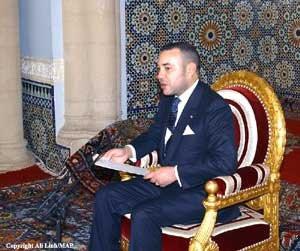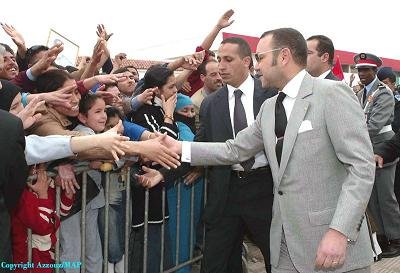HM King Mohammed VI Voices Resolve to Ensure Optimal Implementation of Family Code
RABAT, Feb.03 – HM King Mohammed VI reiterated this Tuesday his resolve to ensure optimal implementation and to gather all the needed conditions for the implementation of the new family code, after its adoption by the two parliamentary chambers.
The sovereign made the statement as he was receiving speakers of the House of Representatives (lower chamber) and Chamber of Advisors (upper chamber), respectively Abdelouahed Radi and Mustapha Okacha, following the adoption by the two houses of the new family law (Mudawanna), the outline of which was spelled out last October 10 by HM the King at the opening of the parliament’s fall session.
The sovereign who stressed that the new law “is not only a major achievement for women, but also an ingredient which enhances the Moroccan family as a balanced and modern institution” voiced determination “to ensure that the material and human resources, along with the legal mechanisms which are necessary for the enforcement of the Family Law are provided.”
“I shall spare no effort to ensure its optimal implementation by a judiciary which is qualified, independent, efficient and fair”, the king vowed before calling for a broad information campaign by “all forums, institutions and organizations”…
“We need to move forward in our endeavour to achieve integrated development. We must see that concrete efforts and fieldwork are encouraged in order to foster effective development of the family. We should release energies and initiate concerted actions to strengthen the foundations of the modern democratic nation we are looking forward to”, HM the king went on before reiterating resolve “to carry on with the reforms undertaken and aimed at ensuring that men and women become partners, sharing the same rights and obligations and contributing to building effective, responsible citizenship.”
After reaffirming “constant commitment to the values which served as a foundation for this legislation”, the sovereign further explained that the crucial importance of the law lies not only in its primary role in building a modern society but also in the evidence it produces to the ability of Islam to be compatible with the principles of freedom, equality, equity and solidarity.
“This law is a real milestone in the history of Morocco, not only because it is the bedrock for the construction of our modern democratic society, but also because, through this legislation, we are demonstrating in a concrete and compelling manner that Islamic and universal referentials make up a single entity based on freedom, equality, equity and solidarity”, HM the king underlined.
“Through this pioneering work, I am, as Amir Al Muminin (Commander of the Faithful), helping in the efforts that should be made by the Islamic Ummah as a whole, to restore the true image of Islam which is wrongly and unjustly depicted as an outdated and extremist religion. The aim is to give further evidence that the Islamic mentality and school of thought are inherently capable of accommodating modernity and progress, while displaying a great deal of tolerance and open-mindedness.”
After recalling that since his accession to the throne (in July 1999), one of the top objectives of the policy he has been pursuing “has been to develop, in the midst of varying and heterogeneous trends, a modern Family Law, which boasts such features and references as those we have today”, he paid tribute to all the nation's representatives and productive elements “for the unanimous stance they adopted, and for the conscientiousness and sense of democracy they showed during the debate on this issue, as well as for their strong commitment to the bonds which unite the Throne and the people.”
RABAT, Feb.03 – HM King Mohammed VI reiterated this Tuesday his resolve to ensure optimal implementation and to gather all the needed conditions for the implementation of the new family code, after its adoption by the two parliamentary chambers.
The sovereign made the statement as he was receiving speakers of the House of Representatives (lower chamber) and Chamber of Advisors (upper chamber), respectively Abdelouahed Radi and Mustapha Okacha, following the adoption by the two houses of the new family law (Mudawanna), the outline of which was spelled out last October 10 by HM the King at the opening of the parliament’s fall session.
The sovereign who stressed that the new law “is not only a major achievement for women, but also an ingredient which enhances the Moroccan family as a balanced and modern institution” voiced determination “to ensure that the material and human resources, along with the legal mechanisms which are necessary for the enforcement of the Family Law are provided.”
“I shall spare no effort to ensure its optimal implementation by a judiciary which is qualified, independent, efficient and fair”, the king vowed before calling for a broad information campaign by “all forums, institutions and organizations”…
“We need to move forward in our endeavour to achieve integrated development. We must see that concrete efforts and fieldwork are encouraged in order to foster effective development of the family. We should release energies and initiate concerted actions to strengthen the foundations of the modern democratic nation we are looking forward to”, HM the king went on before reiterating resolve “to carry on with the reforms undertaken and aimed at ensuring that men and women become partners, sharing the same rights and obligations and contributing to building effective, responsible citizenship.”
After reaffirming “constant commitment to the values which served as a foundation for this legislation”, the sovereign further explained that the crucial importance of the law lies not only in its primary role in building a modern society but also in the evidence it produces to the ability of Islam to be compatible with the principles of freedom, equality, equity and solidarity.
“This law is a real milestone in the history of Morocco, not only because it is the bedrock for the construction of our modern democratic society, but also because, through this legislation, we are demonstrating in a concrete and compelling manner that Islamic and universal referentials make up a single entity based on freedom, equality, equity and solidarity”, HM the king underlined.
“Through this pioneering work, I am, as Amir Al Muminin (Commander of the Faithful), helping in the efforts that should be made by the Islamic Ummah as a whole, to restore the true image of Islam which is wrongly and unjustly depicted as an outdated and extremist religion. The aim is to give further evidence that the Islamic mentality and school of thought are inherently capable of accommodating modernity and progress, while displaying a great deal of tolerance and open-mindedness.”
After recalling that since his accession to the throne (in July 1999), one of the top objectives of the policy he has been pursuing “has been to develop, in the midst of varying and heterogeneous trends, a modern Family Law, which boasts such features and references as those we have today”, he paid tribute to all the nation's representatives and productive elements “for the unanimous stance they adopted, and for the conscientiousness and sense of democracy they showed during the debate on this issue, as well as for their strong commitment to the bonds which unite the Throne and the people.”



